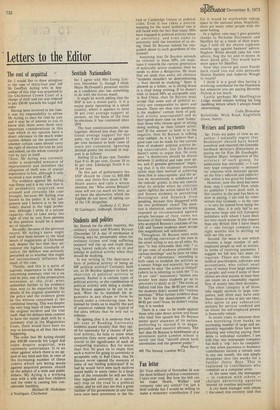Students and politics
Sir: Hurrah for the silent majority, the ordinary citizen and Rhodes Boyson (December 1)! A day of retribution is coming, says he, presumably when the ordinary citizen and long suffering taxpayer will rise up and crush those long haired radicals, who sit in and indulge in political activity when they should be studying.
Is not writing in The Spectator a form of political activity or being an MP political activity? Certainly both are, so Dr Boydon appears to have no objection to political activity in general. Rather it is certain types of political activity, or the combination of political activity with being a student that Bryson appears to be out to attack. Were he to marshall his arguments in any shape or form he would make a convincing case, but instead he treats us to exactljr the sort of polemical rubbish that is typical of the ultra leftists that he sets out to criticise.
In opining that it is ominous that 13 per cent of Reading University students stated recently that they opted for university for a chance of political activity, he fails to state what question they were asked, which is crucial to the significance of such all conquering statistics. But far worse than this, he goes on to imply that such a motive for going to university is acceptable only in Red China. Has Dr Boyson never opened the memoirs of some of our leading politicians? If he had he would have seen such motives stated baldly in many cases. In a large part of the remainder he will see that they regarded university as a necessary step on the road to a political career, and he will also see that a great number of the government at any time have once been prominent in the Ox
ford or Carnbirdge Unions or political clubs. Even if one takes a narrow meaning for the word 'political' one is still faced with the fact that many MPs have engaged in political activity when at university, and even came to university with the intention of so doing. Does Dr Boyson extend his misguided abuse to such guardians of the system?
Assuming that Dr Boydon extends no criticism to these MPs, yet maintains it towards the current generation of politically active students, then he needs to draw a distinction. He must first set aside that awful old chestnut "students shouldn't be demonstrating — they should be studying." Sport is allowed as a hobby, so is sitting down in a chair doing nothing. If he doesn't wish to brand MPs as acceptable only in Red China, then Dr Boyson must accept that some sort of political activity are comparable to sport and leisure. There are then two questions: is the students' current form of political activity unacceptable? and do therspend more time on their 'hobby' than those who choose sport or sitting doing nothing as their, leisure activities? If the answer to both is in the negative, then Dr Boyson is talking utter rubbish. As it is, I believe that ,a good case can be made for the current form of students' political activity being unacceptable, but Dr Boydon doesn't seem to argue this. He even says "a distinction should be drawn between 1) political and take over sitins, and 2) genuine grievances" implying that it is the students' demands rather than their method of achieving them that is unacceptable, and the action he recommends is withdrawal of the radicals' grants. Is this not exactly what he attacks when he criticises (quite rightly) the action taken by LSE and Sussex students in preventing Huntington and Eysenck from speaking, because they disagreed with the two professors' views? The question is rhetorical, sanctions are being impoged or recommended against people because of their views not because of their methods. Those of you who accepted Boyson's criticism of the LSE and Sussex students must accept this magnificent self indictment. Throughout, Dr Boyson rants with the terrifying conviction of the man in the street trying to win on all sides. He says "it was noticeable that only 7 to 10 per cent of students attended the various meetings" and he later on talks of "cells of extremists," intending in both cases to establish the activists as a lunatic fringe and minority, but next moment he says "the scene at Oxford" (which he is referring to with the "7 to 10 per cent" statement) "makes one wonder how many students go up to university to study at all." The scene at Oxford told him that 90-93 per cent of the students didn't attend the "various meetings." What further evidence does he have for the dissoluteness of this 90-93 per cent? None, he doesn't realise that it is needed.
There is a case to be made against those who take direct action and those who limit free speech but Dr Boyson seems quite unaware of its nature, preferring tc shroud it in anger, prejudice and emotive phrases. The fact that Dr Boyson is headmaster of a prominent north London school is surely one that "should alarm both universities and the general public."
Paul Barry 405 The Strand, London WC2.










































 Previous page
Previous page